| Listing 1 - 10 of 46 | << page >> |
Sort by
|
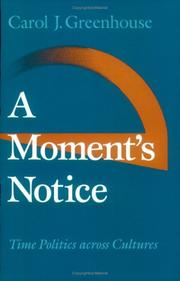
ISBN: 0801482283 0801430615 1501725025 9781501725029 9780801430619 9780801482281 Year: 2018 Publisher: Ithaca, NY : Cornell University Press,
Abstract | Keywords | Export | Availability | Bookmark
 Loading...
Loading...Choose an application
- Reference Manager
- EndNote
- RefWorks (Direct export to RefWorks)
Focusing on the problem of time-the paradox of time's apparent universality and cultural relativity-Carol J. Greenhouse develops an original ethnographic account of our present moment, the much-heralded postmodern condition, which is at the same time a reflexive analysis of ethnography itself. She argues that time is about agency and accountability, and that representations of time are used by institutions of law, politics, and scholarship to selectively refashion popular ideas of agency into paradigms of institutional legitimacy. A Moment's Notice suggests that the problem of time in theory is the corollary of problems of power in practice.Greenhouse develops her theory in examinations of three moments of cultural and political crisis: the resistance of the Aztecs against Cortes, the consolidation of China's First Empire, and the recent partisan political contests over Supreme Court nominees in the United States. In each of these cases, temporal innovation is integral to political improvisation, as traditions of sovereignty confront new cultural challenges. These cases return the discussion to current issues of inequality, postmodernity, cultural pluralism, and ethnography.
Political anthropology. --- Time --- Social aspects. --- Anthropology, Political --- Government, Primitive --- Ethnology --- Political science --- Anthropological aspects
Book
ISBN: 3869452609 9783869452609 9783883096278 388309627X Year: 2011 Publisher: Nordhausen, Germany : Verlag Traugott Bautz,
Abstract | Keywords | Export | Availability | Bookmark
 Loading...
Loading...Choose an application
- Reference Manager
- EndNote
- RefWorks (Direct export to RefWorks)
Die Alten sagen uns mit ihrem tiefen historischen Erfahrungswissen, warum Staaten untergehen. Daraus lässt sich ein überzeitlich gültiges Raster von Untergangsformen entwickeln. Die Klassiker der Geschichtsschreibung haben uns deutlich vorgegeben und mühsam herausgearbeitet, wann und wie Herrschaften entstehen und wann sie untergehen, unter welchen Bedingungen sie gut sind und unter welchen schlecht. Das soll hier einleitend referiert und zugleich mit einigen historischen Beispielen exemplarisch unterfüttert werden. Wichtig für den Untergang ist dabei oft, dass die mythischen Grundlagen eines
Political anthropology. --- Anthropology, Political --- Government, Primitive --- Ethnology --- Political science --- Anthropological aspects
Book
ISBN: 3110398052 3486840665 9783110398052 9783486840667 9783486840667 348658037X Year: 2017 Publisher: München ; Wien : De Gruyter Oldenbourg,
Abstract | Keywords | Export | Availability | Bookmark
 Loading...
Loading...Choose an application
- Reference Manager
- EndNote
- RefWorks (Direct export to RefWorks)
Das Handbuch behandelt in über 150 eigenständigen Artikeln den grundlegenden Wortschatz des französischen Ancien Régime und der Französischen Revolution. Gestützt auf eine reichhaltige Quellenbasis erarbeiten mehr als 50 Forscher aus Deutschland, Frankreich und den USA ein Grundlagenwerk zur Geistes- und Mentalitätsgeschichte. In over 150 standalone articles, this work covers the basic vocabulary of the French Ancien Régime and the French Revolution. Based on an extensive selection of sources, over 50 experts from Germany, France, and the US have created a basic reference work on intellectual history and the history of mentalities.
Political anthropology. --- Anthropology, Political --- Government, Primitive --- Ethnology --- Political science --- Anthropological aspects
Book
ISBN: 3732865819 383766581X Year: 2023 Publisher: Bielefeld, Germany : transcript Verlag,
Abstract | Keywords | Export | Availability | Bookmark
 Loading...
Loading...Choose an application
- Reference Manager
- EndNote
- RefWorks (Direct export to RefWorks)
Politisches Denken und Handeln setzt immer schon ein Bild vom Menschen voraus und doch bleibt der Mensch als politisches Argument häufig im Dunkeln. Frauke Höntzsch skizziert eine politikwissenschaftliche Anthropologie, deren Ziel es ist, die Struktur und den Status anthropologischer Argumente im politischen Denken offenzulegen, um sie so der Kritik zugänglich zu machen. Die Systematisierung anthropologischer Argumente im politischen Denken zeigt dabei nicht nur die Anthropologiekritik als anthropologische Argumentation, sondern generiert mit den untereinander konkurrierenden paradigmatischen Vorstellungen des Menschen zugleich ein politikwissenschaftliches Analyseinstrument.
Political science --- Political anthropology --- Anthropological aspects. --- Philosophy. --- Anthropology, Political --- Government, Primitive --- Ethnology --- Anthropology --- Anthropological aspects
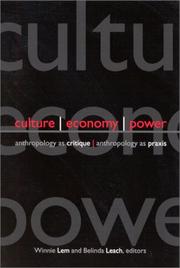
ISBN: 0791489000 058546572X 9780585465722 0791452891 9780791452899 0791452905 9780791452905 9780791489000 Year: 2002 Publisher: Albany : State University of New York Press,
Abstract | Keywords | Export | Availability | Bookmark
 Loading...
Loading...Choose an application
- Reference Manager
- EndNote
- RefWorks (Direct export to RefWorks)
Confronts major questions facing anthropology, Marxist theory, cultural studies, feminism, and history.
Political anthropology. --- Marxist anthropology. --- Anthropology, Political --- Government, Primitive --- Ethnology --- Political science --- Communism and anthropology --- Marxian anthropology --- Anthropology --- Anthropological aspects
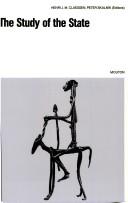
ISBN: 3110825791 9783110825794 9027933480 9789027933485 Year: 1981 Publisher: The Hague ; New York : Mouton,
Abstract | Keywords | Export | Availability | Bookmark
 Loading...
Loading...Choose an application
- Reference Manager
- EndNote
- RefWorks (Direct export to RefWorks)
The Study of the State
State, The. --- Political anthropology. --- Administration --- Commonwealth, The --- Sovereignty --- Political science --- Anthropology, Political --- Government, Primitive --- Ethnology --- Anthropological aspects
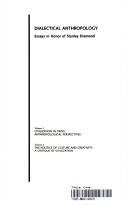
ISBN: 0813019702 9780813019703 0813011167 9780813011165 0813011159 9780813011158 0813011175 9780813011172 0813011183 9780813011189 Year: 1992 Publisher: Tallahassee : University Press of Florida,
Abstract | Keywords | Export | Availability | Bookmark
 Loading...
Loading...Choose an application
- Reference Manager
- EndNote
- RefWorks (Direct export to RefWorks)
Political anthropology. --- Marxist anthropology. --- Communism and anthropology --- Marxian anthropology --- Anthropology --- Anthropology, Political --- Government, Primitive --- Ethnology --- Political science --- Anthropological aspects --- Diamond, Stanley,
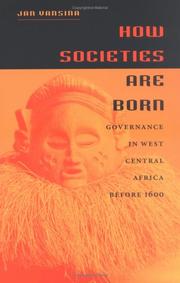
ISBN: 1283806150 0813934184 9780813934181 0813922798 9780813922799 0813922801 9780813922805 9781283806152 Year: 2004 Publisher: Charlottesville : University of Virginia Press,
Abstract | Keywords | Export | Availability | Bookmark
 Loading...
Loading...Choose an application
- Reference Manager
- EndNote
- RefWorks (Direct export to RefWorks)
Interestingly, these proceeded well beyond environmental constraints and were characterized by "major differences in the subjects which enthralled people," whether these were cattle, initiations and social position, or "the splendors of sacralized leaders and the possibilities of participating in them.".
Political anthropology --- Tribal government --- Anthropology, Political --- Government, Primitive --- Ethnology --- Political science --- Tribes --- Anthropological aspects --- Africa, Central --- Africa, Sub-Saharan --- Politics and government. --- Politics
Book
ISBN: 1783718625 1849641048 0585426325 9781849641043 9780585426327 0745316867 9780745316864 9781783718627 Year: 2000 Publisher: London ; Sterling, VA : Pluto Press,
Abstract | Keywords | Export | Availability | Bookmark
 Loading...
Loading...Choose an application
- Reference Manager
- EndNote
- RefWorks (Direct export to RefWorks)
Political anthropology. --- Power (Social sciences) --- Empowerment (Social sciences) --- Political power --- Exchange theory (Sociology) --- Political science --- Social sciences --- Sociology --- Consensus (Social sciences) --- Anthropology, Political --- Government, Primitive --- Ethnology --- Anthropological aspects
Book
ISBN: 1782384022 9781782384021 9781782384014 1782384014 9781785332234 1785332236 Year: 2014 Publisher: New York : Berghahn,
Abstract | Keywords | Export | Availability | Bookmark
 Loading...
Loading...Choose an application
- Reference Manager
- EndNote
- RefWorks (Direct export to RefWorks)
Using a "vertical slice" approach, anthropologists critically analyze the relationship between undemocratic uses and abuses of power and the survival of the human species. The contributors scrutinize modern institutions in a variety of regions-from Russia and Mexico to South Korea and the U.S. Up, Down, and Sideways is an ethnographic examination of such phenomena as debtculture, global financial crises, food insecurity, indigenous land and resource appropriation, the mismanagement of health care, andcorporate surrogacy within family life. With a preface by Laura Nader, this isessential readi
| Listing 1 - 10 of 46 | << page >> |
Sort by
|

 Search
Search Feedback
Feedback About UniCat
About UniCat  Help
Help News
News